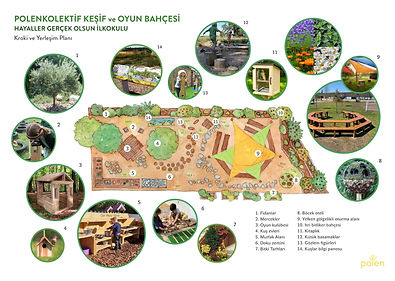
Why & How
The idea for POLEN was conceived in 2016 with an eye to the impact of our urban lives, surrounded by the technological possibilities of the age but increasingly inward-looking and disconnected from nature, especially on children...

POLEN's dream was “a garden” where children could meet, practice within permaculture principles through ecology and art. To create open spaces where children can experience the cycles of nature, learn from the soil hands on and connect with themselves and with life; to share their knowledge and experiences based on love and respect... To achieve this, cooperation, division of labour, the creation of a democratic environment that allows everyone to express their ideas freely and mutual trust have been important since from the emergence of the idea.
The aim of POLEN is to bring together educators (permaculture designers, artists, scientists, etc.) who have relatively few opportunities to meet, think and create produce together in everyday life; to carry out solidarity and holistic programs to help raise critical and critical and creative children, centered on the universality of art and ecology; to contribute to the social, emotional and cognitive growth of children.


POLEN would like to continue its work, which began with the Gümüşgöze Children's Home in Hatay in early March, after February 6th, 2023 earthquake. POLEN has demonstrated how restorative and constructive it is for children and their families to be in contact with nature, art and each other as they emerge from this great destruction. For this reason, we want to continue our activities in various other spots too.
POLEN paydaşları, bir narenciye bahçesinde kurdukları çadır etrafında başladıkları ve ismini köyden iki kız çocuğunun “Gümüşgöze Çocukevi” olarak koyduğu çalışmalarını, 2.5 yıldan fazla emek verdikten sonra Haziran 2025’de sonlandırdı; ancak Eylül 2025’de Gümüşgöze İlk ve Orta Okulunun içine, çocuklara, öğretmen ve ebeveynlere 1000'den fazla iyi kitapla birlikte kalıcı bir “PolenKolektif Çocuk Kütüphanesi / Atölye Alanı”nı yeni bir mekan olarak hediye etti.

-
to take advantage of the ability of nature, art and play to reduce inequalities among children
-
to offer the skills and experience of its collaborators to the field
-
to foster the practice of living and creating in harmony with nature by preventing the formation of social prejudices from an early age; observe and draw inspiration and knowledge from natural phenomena such as diversity, coexistence, mutual enrichment, transformation, balance, harmony and adaptation
-
to bring the subject of 'nature literacy', which is not part of the school curriculum and which families can only make part of their children's lives through paid workshops or their own efforts, to the children in the city and country's in deprived urban and rural neighborhoods
-
to make a difference for families, education professionals and institutions by putting children first.

POLEN, 2026 itibariyle Hatay / Defne bölgesindeki çalışmalarına devam etmek istiyor. Güncel projemiz; Antakya/ Defne- Bahçeköy’de bu eğitim öğretim yılında açılmış olan “Hayaller Gerçek Olsun İlkokulu”nun 80 m2’lik toprağına yeni bir “Polenkolektif Bahçe ve Oyun Alanı” kurmak. Bu amaçla ekte görmüş olduğunuz tasarımı hayata geçirebilmek için desteğinize ihtiyaç duyuyor.
POLEN Aims;

Activity Planning and Content
The common themes of the workshops that are facilitated by artists from different disciplines (musicians, sculptors, writers, painters, photographers , etc.) are ecology and art. In these critical times when scientists talk of the beginning of "sixth massage of extinction", Polen aims to organize workshops to remind children that we are a part of the ecosystem, while telling and reminding them to review our consumption habits, to produce soil with simple methods at home, to grow our own food, to dream together, to design, to upcycle, to notice the seeds at home, to plant saplings.
Here are some examples of planned workshops:
-
Storytelling and writing about forest visits and planting trees
-
Nature games, exploring the natural environment, talking about the seasons
-
Reflecting on basic human needs such as air, water and seeds as the basis of food security, making seed balls
-
Painting and sculpture design with recycled materials (newspaper, paper and plastic waste, etc.).
-
Making toys with materials collected from nature (branches, leaves and grass, etc.).
-
Composting and worm composting workshops to guide children on the process of transforming organic waste into soil.
-
Observation of paintings and photographs, individual and collective works based on the works
-
Empathy, expression of emotions, thoughts and dreams through music and stories
